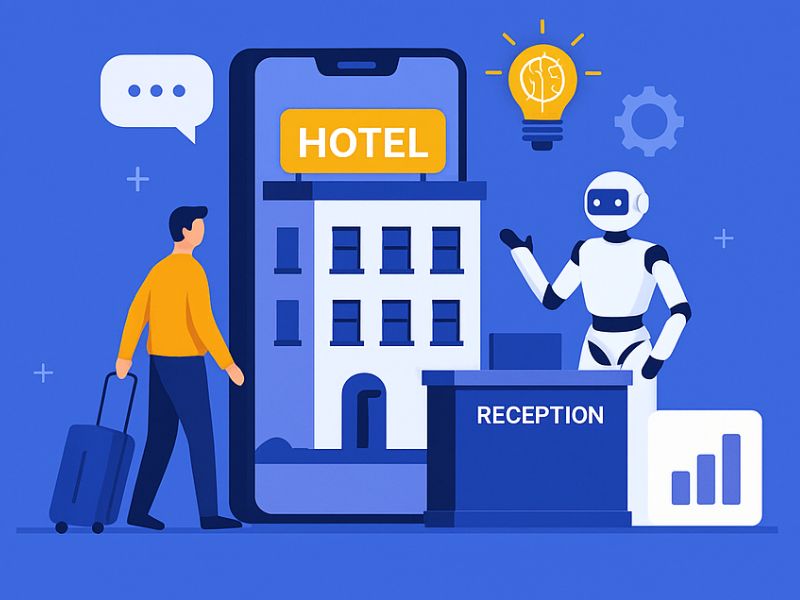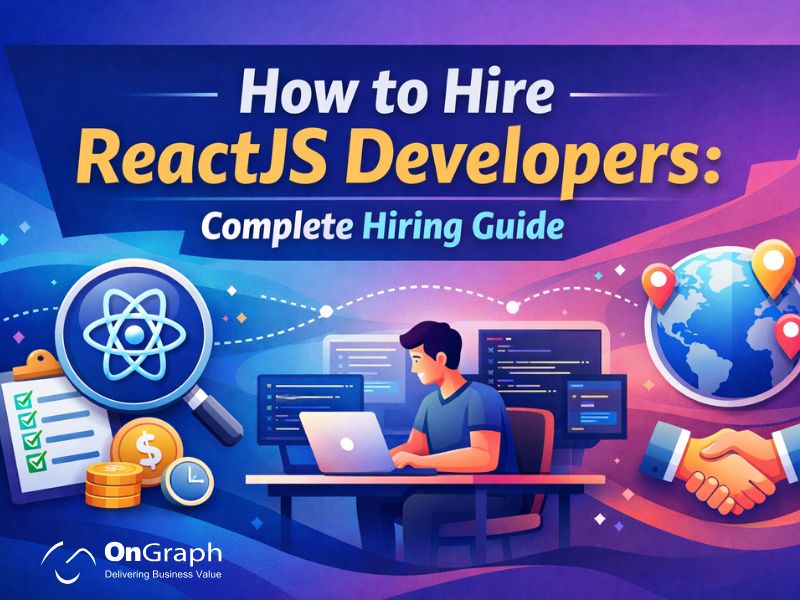In this article
- Why AI in Hotel Management Matters?
- Top AI Use Cases in Hotel Operations
- Real-World Examples of AI in Hospitality
- Implementation Roadmap: How Hotels Can Get Started with AI
- Challenges to Consider
- The Future of AI in Hotel Management
- How OnGraph Technologies Can Help You Implement AI in Hotel Management
- Final Thoughts
Revolutionizing hotel management with AI (Artificial Intelligence) is no longer a futuristic concept—it’s happening now. AI is reshaping every aspect of our lives, and the hospitality industry is no exception. With growing pressure on hotel owners and operators to deliver personalized experiences, reduce operational costs, and uphold high service standards, AI is emerging as a game-changing solution.
This blog explores how AI is revolutionizing hotel management, driving operational efficiency, and transforming the guest experience.
Why AI in Hotel Management Matters?
Hotels today face challenges such as labor shortages, rising guest expectations, and tight operational budgets. Traditional methods of hotel management often fall short in addressing these evolving demands. AI bridges the gap by introducing automation, predictive analytics, and intelligent personalization to streamline operations and enhance customer satisfaction.
Key Benefits of AI in Hotel Management
- Faster check-ins/check-outs
- Real-time guest assistance
- Personalized services
- Reduced labor costs
- Predictive maintenance and resource optimization
Top AI Use Cases in Hotel Operations
1. AI Chatbots for 24/7 Guest Communication
AI-powered chatbots are deployed across hotel websites and mobile apps to provide round-the-clock assistance. They can handle queries, make bookings, suggest services, and even upsell packages—all in multiple languages.
2. Smart Room Automation
AI enables guests to control room lighting, temperature, and entertainment systems using voice commands or mobile apps. Integration with IoT further enhances the personalized guest experience.
3. Predictive Analytics for Demand Forecasting
By analyzing historical booking trends, local events, and weather patterns, AI tools can predict occupancy rates and optimize pricing strategies. This leads to better revenue management and improved room availability.
4. Personalized Guest Experience
AI algorithms track guest preferences and behavior to deliver tailored services—from room preferences to food suggestions. Some hotels even use facial recognition for check-ins and personalized greetings.
5. Housekeeping and Maintenance Automation
AI systems predict when rooms need cleaning or maintenance, helping staff optimize schedules and reduce turnaround time. Some hotels use robots for basic housekeeping tasks.
6. Dynamic Pricing and Inventory Management
AI systems adjust room rates in real-time based on demand, competitor pricing, and guest booking patterns. Inventory and resource allocation also become more efficient through AI-driven insights.
Real-World Examples of AI in Hospitality
- Hilton’s “Connie” – A robot concierge that uses IBM’s Watson to assist guests.
- Marriott International – Uses AI for demand forecasting and dynamic pricing.
- Aloft Hotels (by Marriott) – Offers voice-controlled room service and automation through in-room smart hubs.
These case studies show how AI can make both small and large-scale operations more efficient and guest-centric.
Implementation Roadmap: How Hotels Can Get Started with AI
- Start Small – Begin with AI chatbots or automated booking systems.
- Integrate with Existing PMS/CRM – Ensure AI tools can access customer data and booking systems.
- Train Staff – Employees must be trained to work alongside AI tools, not against them.
- Monitor ROI – Track key metrics such as guest satisfaction, occupancy rates, and cost savings.
Challenges to Consider
- Initial Cost – AI solutions may require significant upfront investment.
- Data Privacy – Handling guest data must comply with privacy regulations (e.g., GDPR).
- Staff Resistance – Address concerns about job security and emphasize AI as an enabler.
The Future of AI in Hotel Management
Revolutionizing hotel management further, AI’s role will only expand with advancements in Natural Language Processing (NLP), facial recognition, and robotic process automation (RPA). Hotels that embrace these cutting-edge technologies early are positioning themselves for a significant competitive advantage.
Upcoming innovations:
- Emotion-detecting AI for better guest engagement
- Fully automated self-check-in kiosks
- Hyper-personalized marketing based on behavioral data
How OnGraph Technologies Can Help You Implement AI in Hotel Management?
Adopting AI in your hotel operations is no longer just an innovation—it’s a competitive necessity. At OnGraph Technologies, we specialize in building AI-powered solutions that are tailored to the specific needs of the hospitality industry.
With over 17 years of experience and a proven track record in custom software development, our AI development team can help you:
- Develop AI chatbots for 24/7 guest communication and multilingual support
- Integrate smart room automation systems for enhanced guest experiences
- Build predictive analytics dashboards for dynamic pricing and occupancy forecasting
- Implement AI-driven CRM systems to personalize guest journeys and increase retention
- Automate housekeeping and operations through intelligent task scheduling
Whether you operate a boutique hotel or a global hospitality chain, our end-to-end AI development services can help you reduce operational costs, boost efficiency, and deliver unforgettable guest experiences.
👉 Let’s build the future of hospitality together. Contact OnGraph Technologies to start your AI transformation journey today.
Final Thoughts
AI is not just a technological upgrade—it’s a strategic shift in how hospitality is delivered. From enhancing guest interactions to optimizing backend operations, AI is proving to be indispensable in modern hotel management. As guest expectations rise and competition stiffens, adopting AI can be the differentiator your hotel needs.
FAQs
AI is used in guest communication, dynamic pricing, housekeeping automation, and personalized experiences.
AI enhances operational efficiency, reduces labor costs, and provides a better guest experience through automation and personalization.
AI doesn’t replace staff but automates repetitive tasks so staff can focus on high-touch guest interactions.
Costs vary based on the solution, but SaaS-based AI tools offer cost-effective entry points for small hotels.
Data breaches, high implementation costs, and guest resistance to automation are potential risks.
Marriott, Hilton, and AccorHotels are among the major chains adopting AI-driven innovations.
About the Author
Let’s Create Something Great Together!
Latest Blog


















